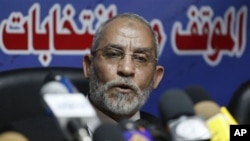The head of Egypt's opposition Muslim Brotherhood is saying Saturday that his group will participate in parliamentary elections next month, fielding candidates for 30 percent of the seats in the chamber. The group is nominally banned, but tolerated by the government.
The decision Saturday by Egypt's powerful Muslim Brotherhood to participate in next month's parliamentary election came as little surprise after other opposition groups appeared to be ignoring calls for a boycott.
The Brotherhood's top leader, Mohamed Badie announced the decision to participate during a news conference in front of the group's parliamentary headquarters in Cairo.
He says that his group has agreed to participate in the upcoming 2010 elections for Egypt's People's Assembly, and will field candidates for up to 30 percent of the seats of that body in accordance with constitutional, legal, and popular rights.
Badie indicated that the names of those candidates would be announced in a few weeks, in the leadup to the November elections.
The Muslim Brotherhood is nominally banned by the government but has long been tolerated. Its members now hold about 20 percent of the seats in the People's Assembly although they are classified as independents.
Last month, opposition leader and former head of the United Nation's International Atomic Energy Agency, Mohammed al Baradei, called for a boycott of the parliamentary poll.
Said Sadek, Professor of Political Sociology at the American University of Cairo, notes that the Brotherhood's decision to field candidates is a slap in the face to al Baradei, since they had been allies up until recently.
"They have their own agenda," he said. "Their ideas about democracy are different from the majority of political parties in Egypt, so it was not expected that they would take the side of al Baradei for long. The declaration that they would participate is for all intents and purposes embarrassing Baradei further, because they were his allies, and they were adopting his 7-point agenda."
Egypt's venerable Wafd Party also voted recently to field candidates in the election, as well, by a 57 to 43 percent margin.
Sadek argues that Egypt's opposition has long been divided, as is the opposition in most Arab countries. The Egyptian government, he insists, wants a loyal, but weak opposition in parliament:
"This is what the government always wanted: a décor, a cosmetic representation of the opposition, not a real opposition, active in affecting bills, policies [and] calling to account the government," said Sadek.
Egyptian President Hosni Mubarak came to power in 1981, after the assassination of his predecessor Anwar Sadat. His National Party controls parliament and is expected to win the November election. Despite complaints of vote-rigging, opposition parties usually do win a considerable number of seats in the People's Assembly.
Egypt's Opposition Muslim Brotherhood to Run in Parliamentary Election




